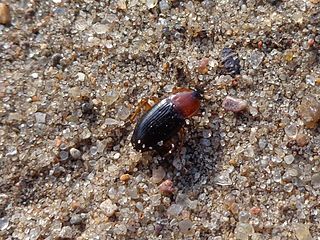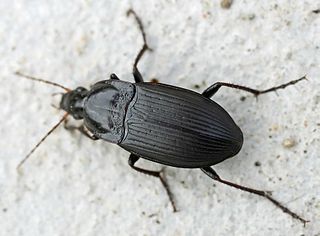
The Indian flying fox, also known as the greater Indian fruit bat, is a species of flying fox native to the Indian subcontinent. It is one of the largest bats in the world. It is of interest as a disease vector, as it is capable of transmitting several viruses to humans. It is nocturnal and feeds mainly on ripe fruits, such as mangoes and bananas, and nectar. This species is often regarded as vermin due to its destructive tendencies towards fruit farms, but the benefits of its pollination and seed propagation often outweigh the impacts of its fruit consumption.

Lonchodraco is a genus of lonchodraconid pterodactyloid pterosaur from the Late Cretaceous of southern England. The genus includes species that were previously assigned to other genera.

Calathus melanocephalus is a species of blackish-red coloured ground beetle from the Platyninae subfamily that can be found everywhere in Europe except for Monaco, San Marino, Vatican City and various European, Asian and African islands. The species is mostly black coloured and have red thorax. It is found in bare, sandy soil, under stones, and in leaf litter. Its flying time is from April to September.
Calathus brevis is a species of ground beetle from the Platyninae subfamily that is endemic to Spain.
Calathus distinguendus is a species of ground beetle from the Platyninae subfamily that can be found in Bulgaria, Greece, Kosovo, Moldova, Montenegro, North Macedonia, Serbia, Voivodina, southern part of Russia and European part of Turkey. It is also found in Georgia, Asia Minor, Caucasus, and Crimea. It have 1 millimetre (0.039 in) long genitalia.

Calathus fuscipes is a species of ground beetle from the Platyninae subfamily that can be found everywhere in Europe except for Andorra, Monaco, San Marino, Vatican City and various islands.
Calathus hispanicus is a species of ground beetle from the Platyninae subfamily that can be found in Portugal and Spain.
Calathus jakupicensis is a species of ground beetle from the Platyninae subfamily that is endemic to North Macedonia.
Calathus korax is a species of ground beetle from the Platyninae subfamily that is endemic to Greece.
Calathus longicollis is a species of ground beetle from the Platyninae subfamily that can be found in Bulgaria, Greece, Russia, Armenia, Cyprus, Georgia, Israel, Lebanon and Turkey.

Calathus luctuosus is a species of ground beetle from the Platyninae subfamily that can be found in Andorra, France, Portugal and Spain.
Calathus mirei is a species of ground beetle from the Platyninae subfamily that is endemic to Spain.
Calathus montivagus is a species of ground beetle from the Platyninae subfamily that can be found in Italy and Sicily.
Calathus pirazzolii is a species of ground beetle from the Platyninae subfamily that is endemic to Italy.
Calathus syriacus is a species of ground beetle from the Platyninae subfamily that can be found on Cyprus, in Ukraine and in southern part of Russia. It is also found in Azerbaijan, Armenia, Georgia, Greece, Iran, Israel, Lebanon, Syria and Turkey.
Calathus vivesi is a species of ground beetle from the Platyninae subfamily that is endemic to Spain.
Calathus vuillefroyi is a species of ground beetle from the Platyninae subfamily that is endemic to Spain.
Calathus obliteratus is a species of ground beetle from the Platyninae subfamily that is endemic to the Canary Islands.

Calathus is a proposed student-designed Ceres sample-return mission, that would consist of an orbiter and a lander with an ascent module. The orbiter would be equipped with a camera, a thermal imager, and a radar; the lander will have a sampling arm, a camera, and a gas chromatograph mass spectrometer. Mission objective is to return maximum 40 g of Ceresian soil. The mission was designed and proposed in 2018 with support of ESA.





